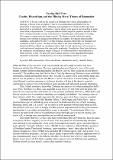Files in this item
Putting hell first : cruelty, historicism, and the missing moral theory of damnation
Item metadata
| dc.contributor.author | Perry, John | |
| dc.date.accessioned | 2016-02-11T11:40:02Z | |
| dc.date.available | 2016-02-11T11:40:02Z | |
| dc.date.issued | 2016-02 | |
| dc.identifier | 229891339 | |
| dc.identifier | b495d6e1-d995-4f08-bdad-0fea49ab5457 | |
| dc.identifier | 85047211468 | |
| dc.identifier | 000374245700001 | |
| dc.identifier.citation | Perry , J 2016 , ' Putting hell first : cruelty, historicism, and the missing moral theory of damnation ' , Scottish Journal of Theology , vol. 69 , no. 1 , pp. 1-19 . https://doi.org/10.1017/S0036930615000745 | en |
| dc.identifier.issn | 0036-9306 | |
| dc.identifier.other | ORCID: /0000-0003-4146-1543/work/43257338 | |
| dc.identifier.uri | https://hdl.handle.net/10023/8202 | |
| dc.description.abstract | Recent work on the morality of hell spans the various subdisciplines of theology, with the ironic exception of theological ethics. An adequate defence of hell requires a positive account of how God’s eternally tormenting some humans is beautiful, just and worthy of worship. This suggests a short-term and long-term task. The short-term task, which this article pursues, tests whether an adequate moral theory is available by evaluating three possible candidates, the third of which is the most interesting, as it offers a historicist defence of hell: we believe hell is cruel only because of aversions to cruel and unusual punishment that emerged in modernity. Nonetheless, all three defences are inadequate, suggesting a longer term goal: we need either better moral theories or better accounts of hell, as well as greater analytic clarity regarding theological statements of the form, 'I want doctrine y to be true but believe doctrine x is true'. | |
| dc.format.extent | 20 | |
| dc.format.extent | 448853 | |
| dc.language.iso | eng | |
| dc.relation.ispartof | Scottish Journal of Theology | en |
| dc.subject | Hell | en |
| dc.subject | Universalism | en |
| dc.subject | Ethics | en |
| dc.subject | Punishment | en |
| dc.subject | Voluntarism | en |
| dc.subject | Cruelty | en |
| dc.subject | Anselm | en |
| dc.subject | History | en |
| dc.subject | BT Doctrinal Theology | en |
| dc.subject.lcc | BT | en |
| dc.title | Putting hell first : cruelty, historicism, and the missing moral theory of damnation | en |
| dc.type | Journal article | en |
| dc.contributor.institution | University of St Andrews. School of Divinity | en |
| dc.identifier.doi | https://doi.org/10.1017/S0036930615000745 | |
| dc.description.status | Peer reviewed | en |
This item appears in the following Collection(s)
Items in the St Andrews Research Repository are protected by copyright, with all rights reserved, unless otherwise indicated.

